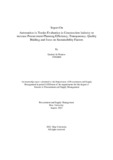Automation in tender evaluation in construction industry to increase procurement planning efficiency, transparency, quality bidding and focus on sustainability factors

View/Open
Date
2021-08Publisher
Brac UniversityAuthor
Wasiew, Qudrati AlMetadata
Show full item recordAbstract
With the ever-changing tools and machineries in construction industry and revolution in material manufacturing, prediction of market price on construction materials has become a tough nut to crack. At the same time, the increasing standards of living and doing things has also affected the labor costs. So, in case of being a buyer of construction goods, works or services can be a vexatious task. Evaluating the bids for varying types of construction works with multi-layers of specifications can be cumbersome. Though in Bangladesh most of the buyers use the PPR as a standard for procurement and LGED schedule of rates as a standard for market price for goods, works and services; but still the bid evaluation procedure has not changed its pattern with the modern touches of IT.
It can be seen that GoB has produced eGP and several MNCs and INGOs have produced integrated ERP systems like SAP; but they all end up to collecting bids but not evaluating them automatically in the system. In most cases, the bidders end up bidding lower than 10% to 15% of the pre-analyzed market price. According to PPR and GSCM policies of private sector buyer urges for rate analysis from bidders. This also consumes another one to two weeks before the notification of award. But, in reality all the buyers are doing boring repetitive works of rate analysis during this period. The primary aim of this study is to build and show a model that can automatically evaluate the bids compared to pre-fetched market rates. The objective is also to show a process that will be able to predict future market changes and bid changes from continuous flow of data from new tenders and bids.
The collection of data was from the archive of Tongi Urban Program, World Vision Bangladesh but used as crypto for serving the purpose of company policies. The study is focused to ease the hectic work of construction SCM. The primary aim is to increase transparency, quality bids and also provide enough time to evaluate sustainability factors of the bidders by the procurement officers or buyers.
The main idea of increasing transparency is evaluating bids in a medium or system that will be noticeable to both the bidders and the buyers. This method would take training of the bidders and data entry specialists. By involving the bidders into the system, a huge amount of transparency can be achieved. Again, by evaluating bids through automatic system would mean a lot less biasness towards any individual. Again, the system is designed to achieve threshold value that will be continuously closer to the market rates. This will encourage bidders to quote better rates and coerce them from quoting unrealistic rates in specific items of work to gain work in anyway. It will result in quality bidding as well as quality of work. Also by automated evaluating system, the organization can provide enough time to the experts and procurement officers to evaluate the sustainability factors and required documents submitted by the bidders with more accountability. This will eliminate fake certificates, illegal documents and force bidders towards achieving a total sustainability.
